外研版初中英语八年级上Module 11 Unit 1 In China,we open a gift later.(共38张PPT)
文档属性
| 名称 | 外研版初中英语八年级上Module 11 Unit 1 In China,we open a gift later.(共38张PPT) |

|
|
| 格式 | zip | ||
| 文件大小 | 4.6MB | ||
| 资源类型 | 教案 | ||
| 版本资源 | 外研版 | ||
| 科目 | 英语 | ||
| 更新时间 | 2020-07-16 00:00:00 | ||
图片预览

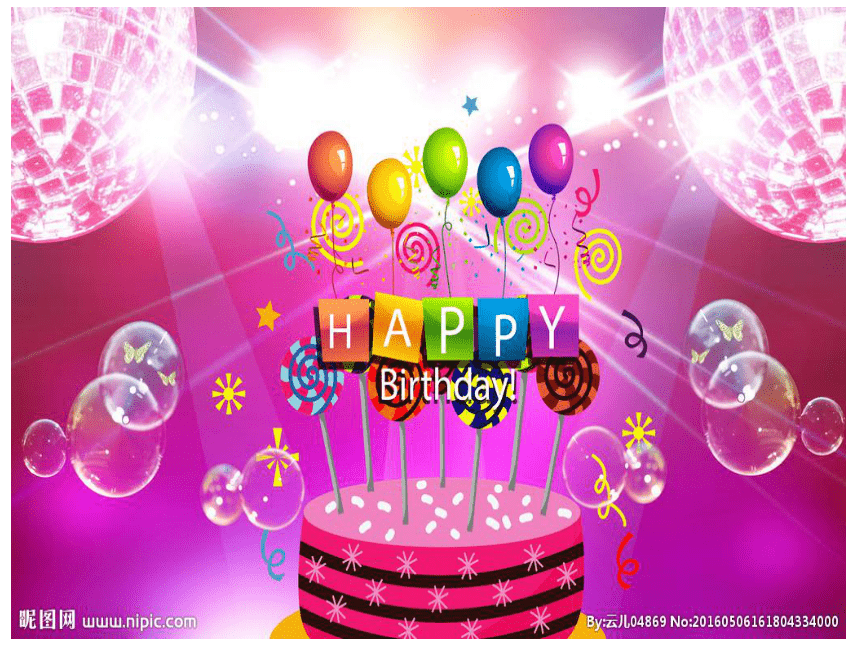

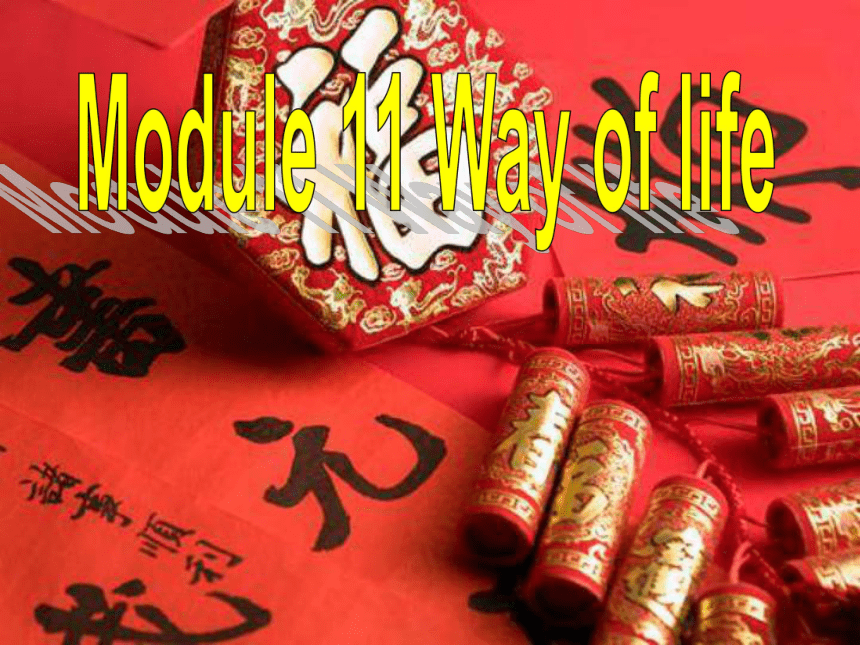
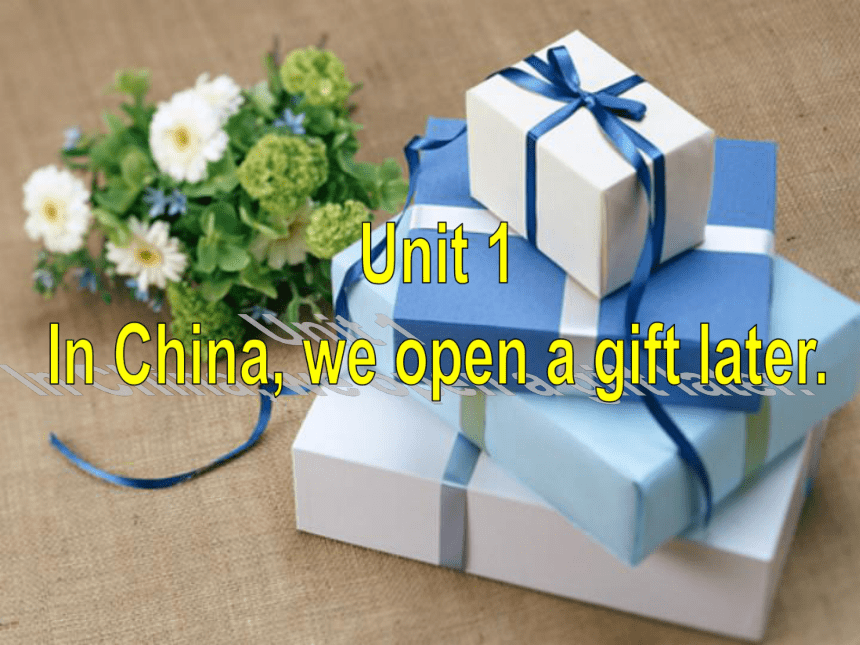
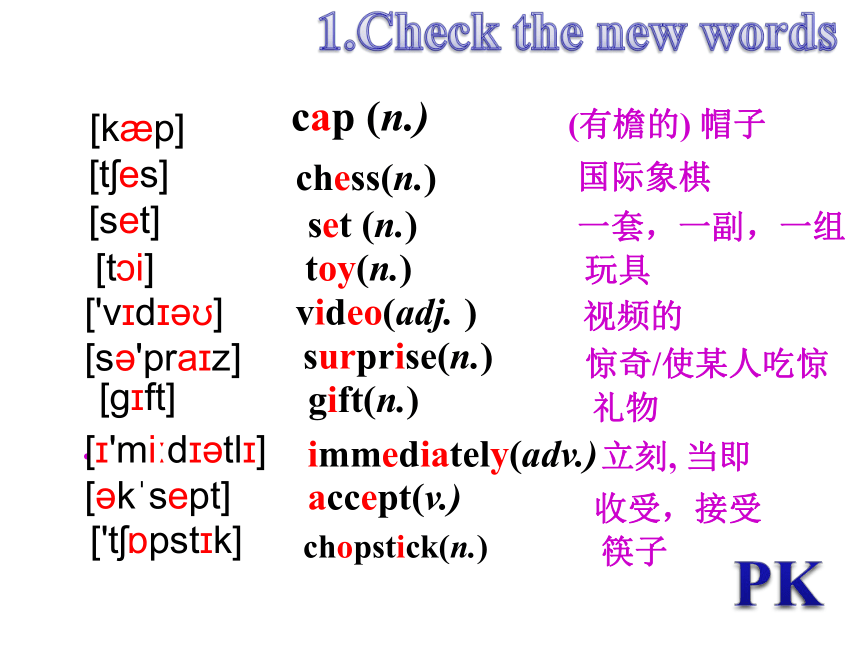
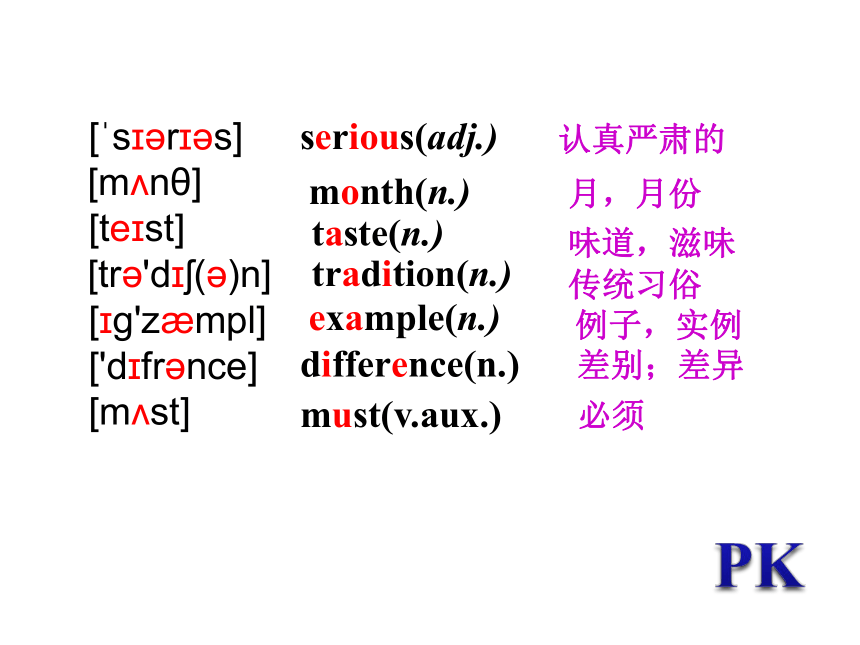

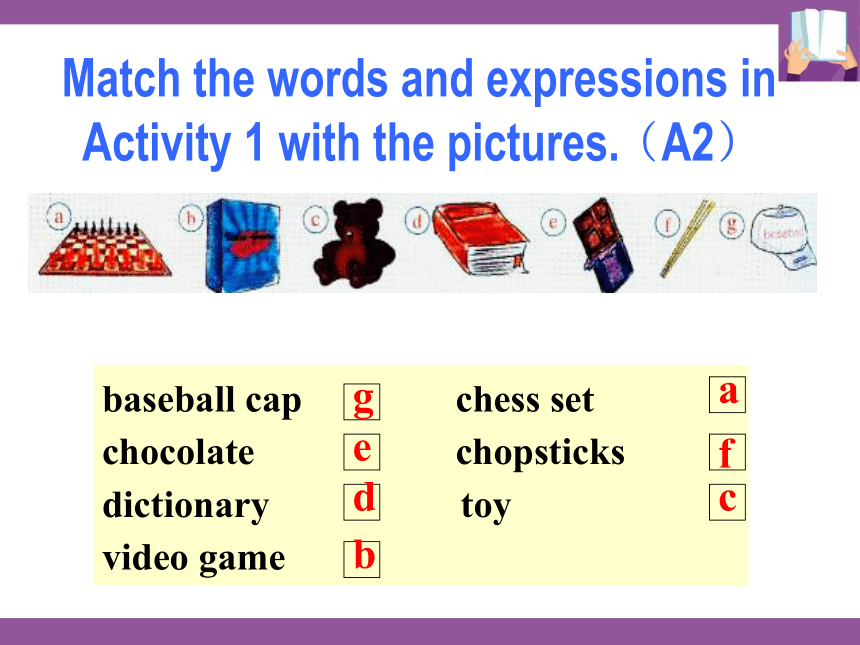
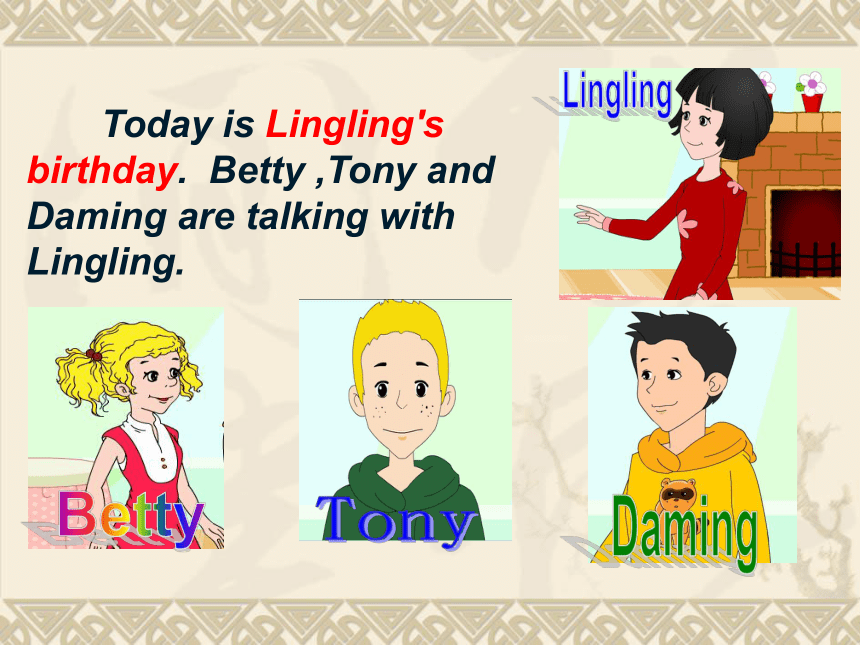


文档简介
(共38张PPT)
Welcome
to
our
class
?Different
manners
in
China
in
the
West
The
way
we
accept
gifts
?
The
time
we
open
gifts
?
Different
manners
to
accept
gifts
中西方接受礼物的不同礼仪
with
both
hands
later
don't
pay
much
attention
to
that
immediately
Module
11
Way
of
life
Unit
1
In
China,
we
open
a
gift
later.
cap
(n.)
?[k?p]
[t?es]
[set]
(有檐的)
帽子
chess(n.)
国际象棋
set
(n.)
?
一套,一副,一组
筷子
toy(n.)
?[t?i]
玩具
video(adj.
)
视频的
surprise(n.)
?
惊奇/使某人吃惊
gift(n.)
?[g?ft]
礼物
immediately(adv.)
.
立刻,
当即
accept(v.)
1.Check
the
new
words
收受,接受
?
['t??pst?k]
?
['v?d???]
[s?'pra?z]
[?'mi?d??tl?]
[?k?sept]
chopstick(n.)
PK
month(n.)
tradition(n.)
taste(n.)
example(n.)
?
传统习俗
?[?s??r??s]
[m?nθ]
[te?st]
[tr?'d??(?)n]
[?g'z?mpl]
['d?fr?nce]
[m?st]
?
味道,滋味
例子,实例
月,月份
serious(adj.)
认真严肃的
difference(n.)
差别;差异
must(v.aux.)
必须
PK
2.短语连线
接受礼物
Chinese
tradition
对做某事感兴趣
do
some
cleaning
打扫卫生
accept
a
gift
正月初一
have
one's
hair
cut
理发
use
red
paper
for
hongbao
中国习俗
during
the
Spring
Festival
month
用红纸包红包
be
interested
to
do...
在正月期间
on
the
first
day
of
the
Spring
Festival
Match
the
words
and
expressions
in
Activity
1
with
the
pictures.(A2)
baseball
cap
chess
set
chocolate
chopsticks
dictionary
toy
video
game
g
e
d
b
c
f
a
Betty
Daming
Tony
Lingling
Today
is
Lingling's
birthday.
Betty
,Tony
and
Daming
are
talking
with
Lingling.
A3
听填信息
n.
adv.
n.
In
China
In
the
west
Accept
a
gift
Accept
it
with
both
1._______
.
Open
it
2.______.
Do
not
pay
much
3.______
to
that.
Festivals
On
the
first
day
of
the
4.________
_______
,
you
5._______
do
any
cleaning.
/
v.aux.
1.
Open
a
present
immediately
when
you
receive
it.
2.
Accept
a
present
with
both
hands.
3.
Use
red
paper
for
hongbao.
4.
Do
cleaning
on
the
first
day
of
the
Spring
Festival.
5.
Break
something
during
the
Spring
Festival.
6.
Have
your
hair
cut
during
the
Spring
Festival
month.
√
√
Now
check
what
you
usually
do
in
China.
(√)
later
You
mustn’t
do
You’d
better
not
have
your
hair
cut
during
the
Spring
Festival
month.
(P89)
You
mustn’t
break
anything
1.Read
with
the
video.
2.Read
the
dialogue
in
your
small
groups.(4
minutes)
3.Act
it
out
.
(Group
work)
In
China,
we
accept
a
gift
with___________.
In
the
west,
they
usually_____________
that
tradition.
both
hands.
don't
pay
much
attention
to
Talk
about
the
pictures
In
China,
we
open
a
gift
______.
In
the
US,
they
open
a
gift
___________.
They
_______
wait.
later
immediately
needn
't
Chinese
traditions
in
Spring
Festival
_______________________
on
the
first
day
of
the
Spring
Festival.
You
mustn’t
do
any
cleaning
Chinese
traditions
in
Spring
Festival
You
mustn't
break
anything.
Chinese
traditions
in
Spring
Festival
You
must
only
use
red
paper
for
hongbao
because
red
means
luck
Chinese
traditions
in
Spring
Festival
during
the
Spring
Festival
month.
You’d
better
not
have
your
hair
cut
Chinese
traditions
in
Spring
Festival
In
the
north
of
China,
people
eat
lots
of
jiaozi
!
Read
the
traditions
in
China.
In
China,
what
traditions
do
you
know?
1.
We
open
a
gift
later.
2.
You
accept
a
gift
with
both
hands.
3.
You
mustn’t
do
any
cleaning
on
the
first
day
of
the
Spring
Festival.
4.
You
mustn't
break
anything.
5.
You
must
only
use
red
paper
for
hongbao
because
red
means
luck.
6.
You’d
better
not
have
your
hair
cut
during
the
Spring
Festival
month.
7.
In
the
north
of
China,
people
eat
lots
of
jiaozi!
In
the
US,
we
open
a
gif
immediately.
In
the
West,
we
usually
don’t
pay
much
attention
to
that.
What’s
the
traditions
in
the
West?
Read
the
traditions
in
the
West.
Summary
1.
你必须
/不能干某事
2.
你可以/不可以干某事
3.
你最好
/
最好不要干某事
4.
你应该
/
不应该干某事
You
must
/
mustn't
do
sth.
You
can
/
can't
do
sth.
You
had
better
/
had
better
not
do
sth.
You
should
/
shouldn't
do
sth
.
情态动词
+
动词原形
(You
had
better
=
You'd
better)
Talk
about
what
you
must
and
mustn't/can't
do
in
the
situations.
(Group
work)
?
Must/should...
Mustn’t
/Can’t
At
school
put
up
your
hand
before
you
talk
?
At
the
dining
table
?
talk
with
food
in
your
mouth
In
the
library
On
the
street
eat
in
class
wait
for
others
keep
quiet
smoke
run
through
the
red
traffic
light
obey
the
traffic
rules
Think
about
what
you
must
and
mustn't/can't
do
in
the
situations.
Work
in
groups.
?
Must
Mustn’t
/Can’t
At
school
put
up
your
hand
before
you
talk
?
At
the
dining
table
?
talk
with
food
in
your
mouth
In
public
On
the
street
eat
during
the
class
wait
for
others
to
start
the
meal
情
感
教
育
1.Learn
and
respect
the
traditions
and
the
ways
of
life
in
other
countries.
2.When
you
are
in
Rome,
do
as
the
Romans
do!(入乡随俗)
Homework
1.Remember
the
new
words.
2.Finish
exercises
on
P87-88(学考精练).
3.
need意为“需要”;need的否定形式是need
not
/
needn’t,?意为“不需要;不必要”。由need构成的一般疑问句的肯定回答用must,否定回答用needn’t。如:
I
need
take
a
bus
to
the
park.
You
needn’t
buy
the
car.
—Need
I
take
an
umbrella
with
me?
—Yes,
you
must.
/
No,
you
needn’t.
【运用】单项选择。
1.
—Must
I
sing
the
song
in
Russian?
—No,
you
______.
It’s
up
to
you.
A.
mustn’t?????
B.
can’t??
C.
don’t??
??????
D.
needn’t
2.
Look!
The
traffic
light
has
turned
red.
We
______
stop
our
car.
A.
can??
??????
B.
can’t??
????
C.
must??
????
D.
mustn’t
3.
—I
have
a
serious
headache.
______
I
go
to
school?
—No,
you
needn’t.
A.
Must????
B.
Can?????
C.
Should?
???
D.
May
4.
There’s
an
important
football
match
today.
I
______
miss
it.
A.
may???
??????
B.
can’t??
C.
must??
??????
D.
needn’t
5.
—You
______
park
here!
Look
at
the
sign,
it
says
“No
parking”.
—Sorry,
I
didn’t
notice
that
sign
just
now.
A.
won’t????
?????
?
B.
needn’t
????
C.
mustn’t
????
D.
couldn’t
6.
You
______
return
the
book
now.
You
can
keep
it
until
next
week
if
you
like.
A.
have
to??
?
B.
can’t?
C.
mustn’t?
D.
needn’t
Ⅰ.?根据句意及提示补全所缺单词。
1.
There
are
twelve
m_____
in
a
year.
2.
Yesterday
I
received
some
money,
but
I
didn’t
a_____
it.
3.
My
uncle
sent
me
a
watch
as
my
fifteenth
birthday
g_____.
4.
This
kind
of
apple
t_____
delicious,
so
it
is
popular
with
people.
5.
Jack
and
Mike
are
brothers,
but
there
are
many
d________
between
them.
differences
months
accept?
gift
tastes
Ⅱ.?根据句意及提示写出所缺单词。
1.
At
the
age
of
ten,
my
uncle
learned
to
play
_________
(国际象棋).??
2.
People
in
China
usually
use
_________
(筷子)
to
have
meals.
3.?To
our
_________
(惊奇),
Alice
and
Tony
speak
Chinese
so
well.
4.
Mr
Black
asked
his
daughter
to
go
back
home
___________
(立刻).
immediately?
chess
chopsticks
surprise
5.
Can
you
tell
me
more
about
Chinese
_________
(传统习俗)?
6.
Do
you
think
Mr
Wang
is
too
_______
(认真严肃的)
in
class?
7.
The
shop
over
there
sells
many
different
kinds
of
animal
_______
(玩具).
toys
traditions
serious
Ⅲ.?根据句意用所给动词的适当形式填空。
1.
You
needn’t
________
(water)
the
flowers
today.
2.
Liu
Mei
is
interested
________
(read)
books
by
Lao
She.
3.
The
students
will
do
some
_________
(clean)
this
afternoon.
4.
Many
people
in
the
north
of?China?enjoy
________
(eat)?jiaozi.
5.
Let
me
_______
(tell)
you
something
about
my
school.
tell
water
to
read?
cleaning
eating
Ⅳ.?根据汉语完成句子。
1.?这个男孩喜欢玩电子游戏。
The
boy
likes
playing
_______
_______.
2.?他妈妈给他买了一套狄更斯的小说。
His
mother
bought
him?____
____?____
novels
by
Dickens.
3.?我买了许多种水果,例如香蕉。
I
bought
many
kinds
of
fruit
—
bananas,
_____
_______.
for
example?
video
games
a
set
of
4.?许多人不注意眼部护理的重要性。
Many
people
don’t
_______
________
______
the
importance
of
eye
care.
5.?你是什么时候理发的?
When
did
you
_______
_______
_______
_______?
6.?你最好不要告诉他父母这个坏消息。
_______
_______
_______
_______
his
parents
the
bad
news.
You’d
better
not
tell
pay
attention
have
your
hair
cut
to
Write
a
passage
about
the
school
rules
at
your
school.
Welcome
to
our
class
?Different
manners
in
China
in
the
West
The
way
we
accept
gifts
?
The
time
we
open
gifts
?
Different
manners
to
accept
gifts
中西方接受礼物的不同礼仪
with
both
hands
later
don't
pay
much
attention
to
that
immediately
Module
11
Way
of
life
Unit
1
In
China,
we
open
a
gift
later.
cap
(n.)
?[k?p]
[t?es]
[set]
(有檐的)
帽子
chess(n.)
国际象棋
set
(n.)
?
一套,一副,一组
筷子
toy(n.)
?[t?i]
玩具
video(adj.
)
视频的
surprise(n.)
?
惊奇/使某人吃惊
gift(n.)
?[g?ft]
礼物
immediately(adv.)
.
立刻,
当即
accept(v.)
1.Check
the
new
words
收受,接受
?
['t??pst?k]
?
['v?d???]
[s?'pra?z]
[?'mi?d??tl?]
[?k?sept]
chopstick(n.)
PK
month(n.)
tradition(n.)
taste(n.)
example(n.)
?
传统习俗
?[?s??r??s]
[m?nθ]
[te?st]
[tr?'d??(?)n]
[?g'z?mpl]
['d?fr?nce]
[m?st]
?
味道,滋味
例子,实例
月,月份
serious(adj.)
认真严肃的
difference(n.)
差别;差异
must(v.aux.)
必须
PK
2.短语连线
接受礼物
Chinese
tradition
对做某事感兴趣
do
some
cleaning
打扫卫生
accept
a
gift
正月初一
have
one's
hair
cut
理发
use
red
paper
for
hongbao
中国习俗
during
the
Spring
Festival
month
用红纸包红包
be
interested
to
do...
在正月期间
on
the
first
day
of
the
Spring
Festival
Match
the
words
and
expressions
in
Activity
1
with
the
pictures.(A2)
baseball
cap
chess
set
chocolate
chopsticks
dictionary
toy
video
game
g
e
d
b
c
f
a
Betty
Daming
Tony
Lingling
Today
is
Lingling's
birthday.
Betty
,Tony
and
Daming
are
talking
with
Lingling.
A3
听填信息
n.
adv.
n.
In
China
In
the
west
Accept
a
gift
Accept
it
with
both
1._______
.
Open
it
2.______.
Do
not
pay
much
3.______
to
that.
Festivals
On
the
first
day
of
the
4.________
_______
,
you
5._______
do
any
cleaning.
/
v.aux.
1.
Open
a
present
immediately
when
you
receive
it.
2.
Accept
a
present
with
both
hands.
3.
Use
red
paper
for
hongbao.
4.
Do
cleaning
on
the
first
day
of
the
Spring
Festival.
5.
Break
something
during
the
Spring
Festival.
6.
Have
your
hair
cut
during
the
Spring
Festival
month.
√
√
Now
check
what
you
usually
do
in
China.
(√)
later
You
mustn’t
do
You’d
better
not
have
your
hair
cut
during
the
Spring
Festival
month.
(P89)
You
mustn’t
break
anything
1.Read
with
the
video.
2.Read
the
dialogue
in
your
small
groups.(4
minutes)
3.Act
it
out
.
(Group
work)
In
China,
we
accept
a
gift
with___________.
In
the
west,
they
usually_____________
that
tradition.
both
hands.
don't
pay
much
attention
to
Talk
about
the
pictures
In
China,
we
open
a
gift
______.
In
the
US,
they
open
a
gift
___________.
They
_______
wait.
later
immediately
needn
't
Chinese
traditions
in
Spring
Festival
_______________________
on
the
first
day
of
the
Spring
Festival.
You
mustn’t
do
any
cleaning
Chinese
traditions
in
Spring
Festival
You
mustn't
break
anything.
Chinese
traditions
in
Spring
Festival
You
must
only
use
red
paper
for
hongbao
because
red
means
luck
Chinese
traditions
in
Spring
Festival
during
the
Spring
Festival
month.
You’d
better
not
have
your
hair
cut
Chinese
traditions
in
Spring
Festival
In
the
north
of
China,
people
eat
lots
of
jiaozi
!
Read
the
traditions
in
China.
In
China,
what
traditions
do
you
know?
1.
We
open
a
gift
later.
2.
You
accept
a
gift
with
both
hands.
3.
You
mustn’t
do
any
cleaning
on
the
first
day
of
the
Spring
Festival.
4.
You
mustn't
break
anything.
5.
You
must
only
use
red
paper
for
hongbao
because
red
means
luck.
6.
You’d
better
not
have
your
hair
cut
during
the
Spring
Festival
month.
7.
In
the
north
of
China,
people
eat
lots
of
jiaozi!
In
the
US,
we
open
a
gif
immediately.
In
the
West,
we
usually
don’t
pay
much
attention
to
that.
What’s
the
traditions
in
the
West?
Read
the
traditions
in
the
West.
Summary
1.
你必须
/不能干某事
2.
你可以/不可以干某事
3.
你最好
/
最好不要干某事
4.
你应该
/
不应该干某事
You
must
/
mustn't
do
sth.
You
can
/
can't
do
sth.
You
had
better
/
had
better
not
do
sth.
You
should
/
shouldn't
do
sth
.
情态动词
+
动词原形
(You
had
better
=
You'd
better)
Talk
about
what
you
must
and
mustn't/can't
do
in
the
situations.
(Group
work)
?
Must/should...
Mustn’t
/Can’t
At
school
put
up
your
hand
before
you
talk
?
At
the
dining
table
?
talk
with
food
in
your
mouth
In
the
library
On
the
street
eat
in
class
wait
for
others
keep
quiet
smoke
run
through
the
red
traffic
light
obey
the
traffic
rules
Think
about
what
you
must
and
mustn't/can't
do
in
the
situations.
Work
in
groups.
?
Must
Mustn’t
/Can’t
At
school
put
up
your
hand
before
you
talk
?
At
the
dining
table
?
talk
with
food
in
your
mouth
In
public
On
the
street
eat
during
the
class
wait
for
others
to
start
the
meal
情
感
教
育
1.Learn
and
respect
the
traditions
and
the
ways
of
life
in
other
countries.
2.When
you
are
in
Rome,
do
as
the
Romans
do!(入乡随俗)
Homework
1.Remember
the
new
words.
2.Finish
exercises
on
P87-88(学考精练).
3.
need意为“需要”;need的否定形式是need
not
/
needn’t,?意为“不需要;不必要”。由need构成的一般疑问句的肯定回答用must,否定回答用needn’t。如:
I
need
take
a
bus
to
the
park.
You
needn’t
buy
the
car.
—Need
I
take
an
umbrella
with
me?
—Yes,
you
must.
/
No,
you
needn’t.
【运用】单项选择。
1.
—Must
I
sing
the
song
in
Russian?
—No,
you
______.
It’s
up
to
you.
A.
mustn’t?????
B.
can’t??
C.
don’t??
??????
D.
needn’t
2.
Look!
The
traffic
light
has
turned
red.
We
______
stop
our
car.
A.
can??
??????
B.
can’t??
????
C.
must??
????
D.
mustn’t
3.
—I
have
a
serious
headache.
______
I
go
to
school?
—No,
you
needn’t.
A.
Must????
B.
Can?????
C.
Should?
???
D.
May
4.
There’s
an
important
football
match
today.
I
______
miss
it.
A.
may???
??????
B.
can’t??
C.
must??
??????
D.
needn’t
5.
—You
______
park
here!
Look
at
the
sign,
it
says
“No
parking”.
—Sorry,
I
didn’t
notice
that
sign
just
now.
A.
won’t????
?????
?
B.
needn’t
????
C.
mustn’t
????
D.
couldn’t
6.
You
______
return
the
book
now.
You
can
keep
it
until
next
week
if
you
like.
A.
have
to??
?
B.
can’t?
C.
mustn’t?
D.
needn’t
Ⅰ.?根据句意及提示补全所缺单词。
1.
There
are
twelve
m_____
in
a
year.
2.
Yesterday
I
received
some
money,
but
I
didn’t
a_____
it.
3.
My
uncle
sent
me
a
watch
as
my
fifteenth
birthday
g_____.
4.
This
kind
of
apple
t_____
delicious,
so
it
is
popular
with
people.
5.
Jack
and
Mike
are
brothers,
but
there
are
many
d________
between
them.
differences
months
accept?
gift
tastes
Ⅱ.?根据句意及提示写出所缺单词。
1.
At
the
age
of
ten,
my
uncle
learned
to
play
_________
(国际象棋).??
2.
People
in
China
usually
use
_________
(筷子)
to
have
meals.
3.?To
our
_________
(惊奇),
Alice
and
Tony
speak
Chinese
so
well.
4.
Mr
Black
asked
his
daughter
to
go
back
home
___________
(立刻).
immediately?
chess
chopsticks
surprise
5.
Can
you
tell
me
more
about
Chinese
_________
(传统习俗)?
6.
Do
you
think
Mr
Wang
is
too
_______
(认真严肃的)
in
class?
7.
The
shop
over
there
sells
many
different
kinds
of
animal
_______
(玩具).
toys
traditions
serious
Ⅲ.?根据句意用所给动词的适当形式填空。
1.
You
needn’t
________
(water)
the
flowers
today.
2.
Liu
Mei
is
interested
________
(read)
books
by
Lao
She.
3.
The
students
will
do
some
_________
(clean)
this
afternoon.
4.
Many
people
in
the
north
of?China?enjoy
________
(eat)?jiaozi.
5.
Let
me
_______
(tell)
you
something
about
my
school.
tell
water
to
read?
cleaning
eating
Ⅳ.?根据汉语完成句子。
1.?这个男孩喜欢玩电子游戏。
The
boy
likes
playing
_______
_______.
2.?他妈妈给他买了一套狄更斯的小说。
His
mother
bought
him?____
____?____
novels
by
Dickens.
3.?我买了许多种水果,例如香蕉。
I
bought
many
kinds
of
fruit
—
bananas,
_____
_______.
for
example?
video
games
a
set
of
4.?许多人不注意眼部护理的重要性。
Many
people
don’t
_______
________
______
the
importance
of
eye
care.
5.?你是什么时候理发的?
When
did
you
_______
_______
_______
_______?
6.?你最好不要告诉他父母这个坏消息。
_______
_______
_______
_______
his
parents
the
bad
news.
You’d
better
not
tell
pay
attention
have
your
hair
cut
to
Write
a
passage
about
the
school
rules
at
your
school.
同课章节目录
- Module 1 How to learn English
- Unit 1 Let's try to speak English as much as possi
- Unit 2 You should smile at her.
- Unit 3 Language in use .
- Module 2 My home town and my country
- Unit 1 It's taller than many other buildings.
- Unit 2 Cambridge is a beautiful city in the east o
- Unit 3 Language in use .
- Module 3 Sports.
- Unit 1 Nothing is more exciting than playing tenni
- Unit 2 This year we training more carefully.
- Unit 3 Language in use .
- Module 4 Planes, ships and trains .
- Unit 1 He lives the farthest from school.
- Unit 2 What is the best way to travel.
- Unit 3 Language in use .
- Module 5 Lao She Teahouse.
- Unit 1 I wanted to see the Beijing Opera.
- Unit 2 It descibes the changes in Chinese society.
- Unit 3 Language in use .
- Module 6 Animals in danger.
- Unit 1 It allows people to get closer to them .
- Unit 2 The WWF is working hard to save them all.
- Unit 3 Language in use .
- Revision module A
- Module 7 A famous story
- Unit 1 Alice was sitting with her sister by the ri
- Unit 2 She was thinking about her cat.
- Unit 3 Language in use .
- Module 8 Accidents
- Unit 1 While the car were changing to red, a car s
- Unit 2 I was trying to pick it up when it bite me
- Unit 3 Language in use .
- Module 9 Population
- Unit 1 The population of China is about 1.37 billi
- Unit 2 Arnwick was a city with 200,000 people.
- Unit 3 Language in use .
- Module 10 The weathe
- Unit 1 It might snow.
- Unit 2 The weather is fine all year round.
- Unit 3 Language in use .
- Module 11 Way of life
- Unit 1 In China ,we open a gift later.
- Unit 2 In England, you usually drink tea with milk
- Unit 3 Language in use .
- Module 12 Help
- Unit 1 What should we do before help arrives?
- Unit 2 Stay away from windows and heavy furniture.
- Unit 3 Language in use .
- Revision module B
